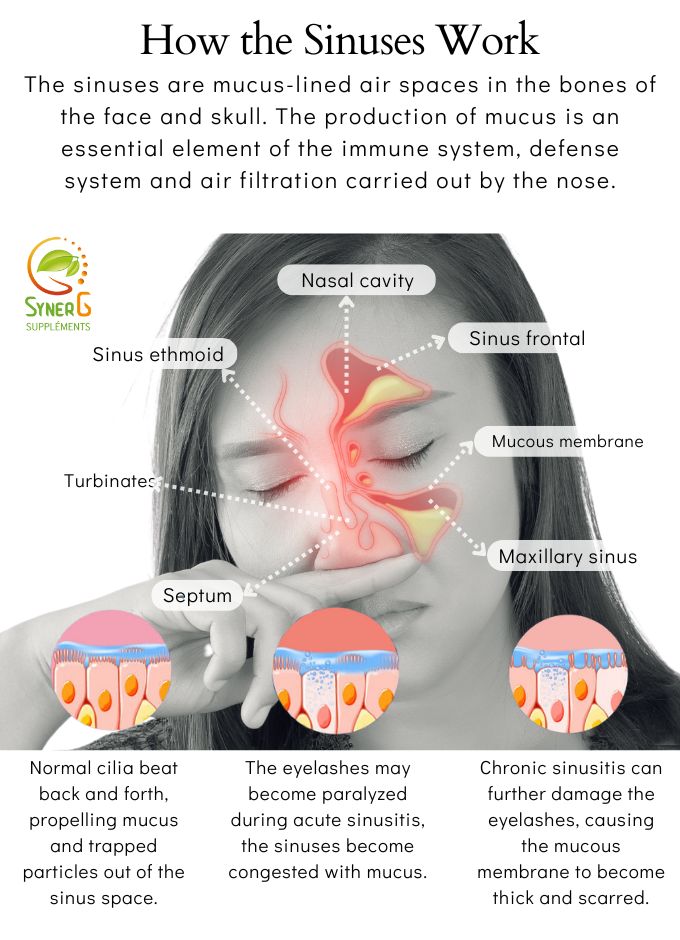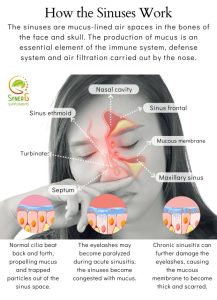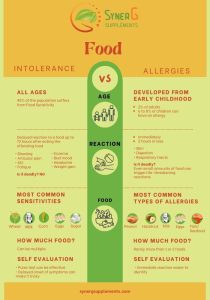
Sinus Congestion: Causes, Symptoms, and Support Strategies

In this article, you will learn about sinus congestion and I will explain the symptoms and main causes of chronic sinus congestion. I will suggest some natural support strategies for sinus congestion to improve your immune system and overall health.
What is Sinus Congestion?
Sinus congestion is a common condition caused by fluid trapping in your sinuses. This can feel like your sinuses are blocked or painful and is often accompanied by nasal congestion. Nasal congestion is commonly referred to as a ‘blocked nose’ because of the sensation of blockage or congestion caused by excess fluid in your nasal tissues and adjacent areas. Nasal congestion may or may not be accompanied by a runny nose.
Acute or temporary sinus congestion is a well-known symptom of the common cold and sometimes the flu. It’s also a symptom of seasonal allergies, food sensitivities, and histamine intolerance.
You may experience a number of symptoms, including:
- Sinus congestion or blocked nose
- Runny nose
- Post-nasal drip or mucus running down your throat
- Facial pain or pressure
- Headaches
- Cough
- Sore throat
- Bad breath
- Fatigue
Main Causes of Sinus Congestion
Sinus Infections
If you have a sinus infection, it means your sinus cavities become inflamed, leading to swelling of your sinus lining. Sinus congestion is one of the main symptoms of sinus infections. You can develop a sinus infection due to a cold, allergies, nasal polyps, or a deviation in your nasal cavity (deviated nasal septum).
Sinus infections can become chronic, leading to chronic sinus congestion that requires more attention and addressing the root cause of your symptoms.
Exposure to Mold
Mold is a fungus that can grow and thrive in many conditions and most places, particularly in a warm and humid environment. It is versatile and can grow both indoors and outdoors. Indoor mold is most often found in bathrooms, kitchens, and basements where the environment is damp, wet, moist, and warm.
The problem is that even if you have mold in one place, its microscopic spores can travel and spread far and wide. Exposure to mold and mold toxicity can be very harmful to your health. This can lead to chronic sinus congestion, respiratory problems, allergies, headaches, concentration disorders, fatigue, and other chronic symptoms.
Environmental Allergies
Environmental allergies are your immune system’s reaction to something in the environment that seems harmful to your body. Environmental allergies can lead to sinus congestion, runny nose, coughing, fatigue, wheezing, headaches, and symptoms similar to those of the common cold.
Common environmental allergies you may encounter include dust mites, pet dander, pollen, mold, and cigarette smoke. Indoor air pollution can be particularly damaging to your respiratory health.
Nasal Polyps
Nasal polyps are small, soft, painless, noncancerous growths inside your nasal passages and sinuses. They resemble little drops hanging like clusters. Although they are not dangerous to your health, they can lead to uncomfortable symptoms.
Nasal polyps can increase chronic sinus congestion, post-nasal drip, nasal obstruction, or facial pain. Traditional treatment for nasal polyps includes corticosteroids or surgery.
Food Sensitivities

One of the common symptoms of food sensitivities is chronic sinus congestion. Other symptoms may include headaches, migraines, digestive disorders, depression, anxiety, concentration disorders, and fatigue.
Common food sensitivities include wheat, gluten, soy, fish, shellfish, eggs, dairy products, peanuts, and nuts, however, you can be sensitive to less common foods as well, so it is essential to discover and eliminate your personal food sensitivities for your health.
Histamine Intolerance
Histamine is a chemical responsible for eliminating allergens from your body as part of your immune response, triggering gastric acid and aiding in digestion, and communicating with your brain. In a healthy body, your body releases certain enzymes to break down and eliminate the buildup of histamine.
But if you have too much histamine in your body due to a histamine-rich diet, nutritional deficiencies, mast cell activation syndrome, intestinal infections, leaky gut syndrome, or other reasons, your body may not be able to keep up, resulting in excess histamine. Histamine intolerance means your body has too much histamine.
This can lead to sinus congestion and other symptoms throughout your body, including allergies, skin problems, headaches, sleep problems, anxiety, digestive issues, hormonal problems, and more.
Natural Support Strategies
If you suffer from sinus congestion, you can support your immune health with natural support strategies. Here are my favourite natural support strategies for sinus congestion that I recommend to my patients, friends, and family.
Anti-Inflammatory Nutritional Plan
Chronic rhinosinusitis is characterized by chronic sinus congestion and associated symptoms for 12 weeks or more due to chronic sinus inflammation. This chronic inflammation can develop due to fungi, viruses, bacteria, airborne irritants, and allergens, but also due to your diet.
Eating an inflammatory diet can lead to increased symptoms, while an anti-inflammatory diet can reduce your symptoms and support your recovery. Eliminate inflammatory foods, including refined sugar, refined oil, high-carb meals, sodas and sweetened drinks, artificial ingredients, fried foods, junk food, and processed foods.
Eat a diet rich in anti-inflammatory foods, including green vegetables, vegetables, herbs and spices, low-glycemic index fruits, fermented foods, healthy fats, grass-fed meat, pasture-raised poultry and eggs, and wild-caught seafood.
Here is what I recommend:
Sinafect from St Francis (Congestion and inflammation)
Bio 82 from Tegor (Infections)
Black Seed Oil from Enerex (Antibacterial and antiviral)
Bio 93 from Tegor (Immune system fortifier)
Bio 84 from Tegor (Environmental allergies)
Sinustop from Herbasanté (Food sensitivities)
Bio 83 from Tegor (Food sensitivities)
D-Hist from Ortho Molecular (Histamine allergies or intolerances)
Quercetin + Nettles from DFH (Antioxidant and anti-inflammatory)
Deep Immune from St-Francis (Immune system)
G15 Sin-Gem from HerbalGem (Sinusitis)
To your good health!

Colombe Gauvin ND. K.in.


